The Vitamin Tonics Market is estimated to be valued at USD 10.7 billion in 2025 and is projected to reach USD 20.3 billion by 2035, registering a compound annual growth rate (CAGR) of 6.6% over the forecast period.
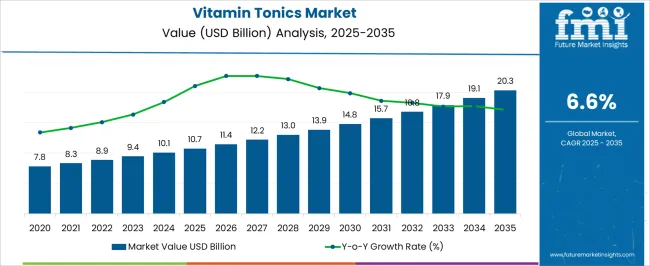
| Metric | Value |
|---|---|
| Vitamin Tonics Market Estimated Value in (2025 E) | USD 10.7 billion |
| Vitamin Tonics Market Forecast Value in (2035 F) | USD 20.3 billion |
| Forecast CAGR (2025 to 2035) | 6.6% |
The vitamin tonics market is witnessing consistent growth, supported by rising consumer awareness about preventive healthcare and the growing importance of nutritional supplementation in daily diets. Increasing prevalence of vitamin deficiencies, lifestyle-related disorders, and dietary imbalances is creating demand for convenient solutions that enhance immunity, energy levels, and overall well-being. Expanding investments in product innovation, including sugar-free formulations and fortified blends, are broadening the consumer base across both developed and emerging economies.
Rising disposable incomes and a growing inclination toward self-care practices are further stimulating demand. Regulatory approvals for fortified health supplements and an expanding retail presence across digital and physical channels are improving accessibility and availability.
Manufacturers are focusing on personalized health solutions and targeting specific consumer segments, including children, working professionals, and elderly populations, to drive market penetration As global health consciousness continues to rise and healthcare systems emphasize prevention over treatment, vitamin tonics are expected to remain a critical part of nutritional regimes, paving the way for long-term market expansion.
The vitamin tonics market is segmented by product type, distribution channel, and geographic regions. By product type, vitamin tonics market is divided into Syrup, Capsules, Tablets, and Multivitamin injections. In terms of distribution channel, vitamin tonics market is classified into Retail Pharmacies and Drug Stores, Hospitals Clinics, Public Hospitals, Private Clinics, and E-commerce. Regionally, the vitamin tonics industry is classified into North America, Latin America, Western Europe, Eastern Europe, Balkan & Baltic Countries, Russia & Belarus, Central Asia, East Asia, South Asia & Pacific, and the Middle East & Africa.
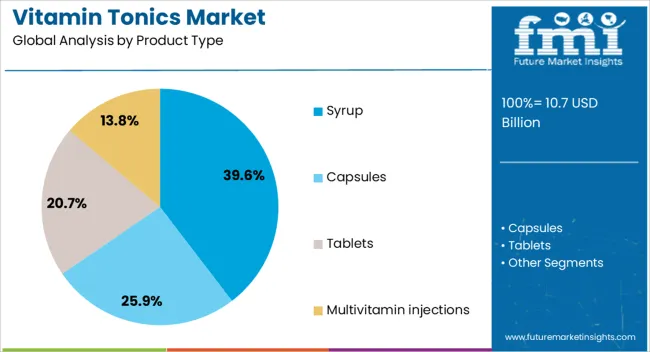
The syrup segment is projected to account for 39.6% of the vitamin tonics market revenue share in 2025, making it the leading product type. Its prominence is being supported by higher consumer preference for liquid formulations that provide ease of consumption and faster absorption compared to solid dosage forms. Syrup-based vitamin tonics are widely accepted across all age groups, including children and elderly individuals, due to their ease of intake and customizable flavors.
The segment’s growth is further reinforced by rising demand for formulations that combine multiple vitamins and minerals in a single dose, thereby enhancing convenience. Continuous advancements in formulation technologies are improving product stability, taste masking, and bioavailability, increasing consumer acceptance globally. The ability to cater to diverse health needs, including immunity, growth, and energy supplementation, is expanding the market potential of syrups.
Widespread availability through pharmacies, retail outlets, and online platforms is further boosting accessibility These combined factors are positioning syrup-based vitamin tonics as the preferred choice among consumers, securing their leadership in the product type category.
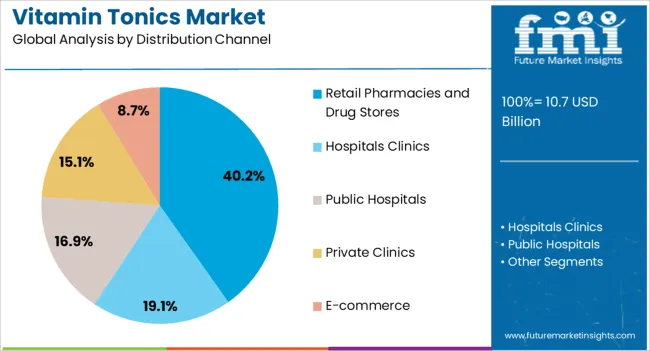
The retail pharmacies and drug stores segment is expected to capture 40.2% of the vitamin tonics market revenue share in 2025, establishing itself as the dominant distribution channel. Its leadership is being reinforced by the strong consumer reliance on pharmacies and drug stores as trusted sources for health and wellness products. The accessibility of these outlets, combined with professional guidance from pharmacists, enhances consumer confidence and purchase decisions.
Retail pharmacies also provide immediate availability, which is crucial for consumers seeking quick and reliable access to health supplements. The growing presence of organized pharmacy chains across urban and semi-urban areas is further expanding reach and availability of vitamin tonics. Promotions, discounts, and loyalty programs run by pharmacies are encouraging repeat purchases and boosting segment growth.
Additionally, the integration of e-pharmacy services and click-and-collect models is enhancing consumer convenience while retaining trust in physical pharmacy networks As consumer preference continues to lean toward credible and accessible distribution points, retail pharmacies and drug stores are expected to maintain their leadership in the vitamin tonics market.
The key factor driving the global market for vitamin tonics is the rising level of wellness consciousness among the general public. An ever-growing portion of the global population believes that it is challenging to expend enough energy to prepare a complex dinner as urbanization increases around the world. Because the nutritional requirements are frequently not met, this may result in a few dietary difficulties. Such folks find vitamin tonics to be of great assistance, which fuels demand across the global market.
Vitamin tonics help in strengthening and invigorating the body tone of an individual. These tonics are used to prevent and treat several deficiency conditions such as rickets, osteomalacia, angular stomatitis, and anemia. The tonics are available in several formulations such as syrupy semisolids, liquids, capsules, tablets and pills, and multivitamin injections.
However, the liquid tonics are more popular due to higher patient compliance and acceptance amongst the children. The physicians prescribe these products in vitamin deficiency anemia such as folate deficiency anemia, pernicious anemia and vitamin C deficiency anemia.
Another significant reason for increasing demand of these products is hectic lifestyle of people across the globe. People tend to compensate their poor dietary habits and lack of exercise by having regular intake of vitamin tonics. Therefore, the global market for the vitamin tonics is witnessing an increasing consumption of these products worldwide.
The major vitamins formulated into vitamin tonics include vitamin B, vitamin C, vitamin D, multivitamin formulations, probiotics and ginseng. There is an increasing demand for multivitamins instead of purchasing single vitamin products.
This has lead vitamin B complex tonic to be the most popular and widely distributed product in the market which contains combination of several vitamins such as B1 (thiamine), B2 (riboflavin), B3 (niacin), B5 (pantothenic acid), B7 (biotin), B9 (folic Acid), and B12 (cobalamin). Vitamin D tonics are also in demand as physicians recommend these products in arthritis and other bone disorders.
One of the most significant nutrient groups that humans ingest is vitamins. They perform a number of essential mental and physical tasks for the body. Serious illnesses like scurvy (vitamin C deficiency), rickets (vitamin D deficiency), and pellagra can result from vitamin deficiencies. As a result, taking vitamins regularly is seen as a good habit.
Vitamin deficiency illnesses are essentially unheard of in the modern world, yet people in less developed areas still frequently succumb to them. Even so, modern consumers' busy lives prevent them from regularly following a balanced diet. As a result, vitamin supplements are becoming more and more well-liked globally. People use vitamin tonics, which are various types of vitamin supplements, all over the world to enhance their daily vitamin consumption.
The study presents the market's competitive and commercial dynamics and looks at every area of the global vitamin tonics market. In-depth conclusions on every facet of the global vitamin tonics market have been reached using dependable analysis methodologies like SWOT analysis and Porter's five forces analysis. The research includes a profile of the leading companies involved in the vitamin tonics market, together with information on the market's drivers and restraints, key segments, and key players.
The key factor driving the global market for vitamin tonics is the growing health consciousness among the people. This is also related to the overall trend of people preferring preventative care over curative treatment, with vitamin tonics assisting customers in avoiding several potential ailments due to the diverse activities that vitamins perform.
Vitamin tonics are typically available to the general public without a prescription because they are regarded as dietary supplements, despite the possibility of overconsumption with vitamins. Considering how simple it is to buy the items, this has greatly fueled the global market for vitamin tonics. Another significant driver of the global vitamin tonics market is the rising sales of nutritional supplements across online marketplaces.
Companies that operate in the global vitamin tonics market have taken advantage of the growing awareness among the populace by running several campaigns to raise awareness of vitamin tonics. This has improved the outlook of the global market for vitamin tonics.
As venous disorders become more common and more novel products are approved to meet this need, the market for vitamin tonics is anticipated to increase significantly throughout the forecast period. The market is expected to develop as a result of rising disease awareness, growing value of early detection, and rising spending on chronic illnesses. Additionally, the major market players are spending money on the creation of technologically improved products, which will enhance the use of Vitamin Tonics products in both developed and emerging nations.
Emerging markets, expanding health benefits knowledge, and rising demand from the younger population are the market's growth drivers. Supplements that supply minerals and vitamins are becoming more and more necessary as a result of factors including an increase in disease rates brought on by bad lifestyle choices and a fast-food diet. Emerging Markets, such as China & India where people lack basic knowledge on nutrition & dietary requirements causing them to supplement with Vitamin Tonics goods have huge potential for market growth.
Due to higher patient compliance and acceptance among children, liquid tonics are more often used. People's busy lifestyles globally, are contributing to the rise in demand for these products. People often take vitamin tonics on a regular basis to make up for their poor eating habits and lack of exercise. As a result, the consumption of vitamin tonics is rising across the globe, which is positive for the industry.
Vitamin Tonics products are not widely used in poorer countries due to limited disease knowledge, high product costs, poor economic conditions, and unfavorable insurance systems. However, the introduction of new, inexpensive goods, and increased market penetration efforts in these areas may present profitable growth prospects for the Vitamin Tonics market's competitors.
The primary industrial trend in the vitamin tonics market has been an increase in R&D spending on product development.
To take advantage of the enormous untapped market prospects in the developing world, the market's top companies are concentrating on creating products that are both affordable and of excellent quality. The rising expenditures on R&D and the rising number of new product approvals provide evidence of this.
Globally people are more aware about their health and brands are capitalizing on this factor. Increased awareness about wellness and fitness has increased the consumer base for the overall vitamin tonics market.
This products are generally available without any prescription which makes them easily accessible to general public who are willing to consume it as health supplement without any medical condition. Increase in global geriatric population is also fueling global market for vitamin tonics market.
Globally, the vitamin tonics market is realizing an astonishing rise due to increasing tendency of people towards spending for preventive measures rather than treating the sickness later. Therefore, increasing awareness about health and wellness among the general public, highly affordable products promises a better and prosperous outlook in the market.
The market leading companies are spending heavily in educating people about the benefits of vitamin tonics which is expected to have positive impact on growth of the market. The increasing regulations on the tonics under the Dietary Supplement Health and Education Act (DSHEA) of 1994 and New Dietary Ingredient (NDI) guidelines have restricted the entry of smaller companies into the market.
Furthermore, the rising interest of pharmaceutical companies in the nutraceuticals segment will make the existing vitamin tonics market more competitive and standardized in terms of quality assurance. For instance, Procter & Gamble (P&G) recently purchased Brattleboro Vermont based New Chapter, Inc., added a FMCG giant into vitamin tonics market making the competition fiercer than ever.
On the basis of geography, the global vitamin tonics market is segmented into seven regions as North America, Europe, Asia-Pacific, Japan, and MEA. The USA market for the vitamin tonics is growing albeit with slowed growth due to consumer questions about the actual benefits of the products and several studies indicating that a large number of companies are simply selling placebos with minute quantities of actual vitamins.
Therefore, dominance of North America into global vitamins market is being challenged by developing regions such as Asia, Latin America and Africa. The market in emerging geographies is growing at a rapid pace owing to rising middle class in countries such as China and India.
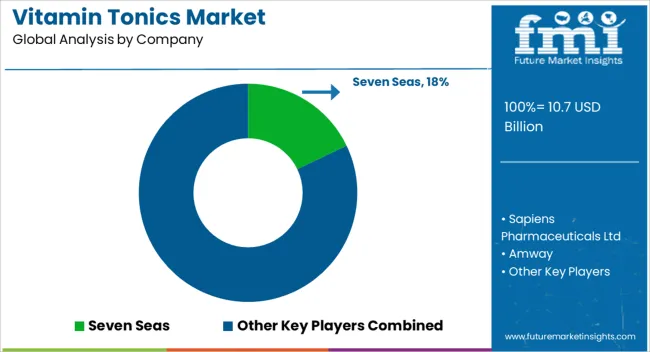
Some of the players in the global vitamin tonics market include Amway, Abbott Laboratories, Albert David Ltd., Vitabiotics Ltd., Seven Seas(a company of Merck KGaA), Sapiens Pharmaceuticals Ltd., Vitane Pharmaceuticals, Inc., Tonic Vitamins, New GPC, Inc., Raptakos Brett & Co. Ltd., Fitzory International Ltd., Lloyds Pharmacy, Cerebos Ltd, Scotch Industrial Thailand Co. Ltd. among others.
The research report presents a comprehensive assessment of the market and contains thoughtful insights, facts, historical data, and statistically supported and industry-validated market data. It also contains projections using a suitable set of assumptions and methodologies. The research report provides analysis and information according to categories such as market segments, geographies, types, technology and applications.
The report is a compilation of first-hand information, qualitative and quantitative assessment by industry analysts, inputs from industry experts and industry participants across the value chain. The report provides in-depth analysis of parent market trends, macro-economic indicators and governing factors along with market attractiveness as per segments. The report also maps the qualitative impact of various market factors on market segments and geographies.
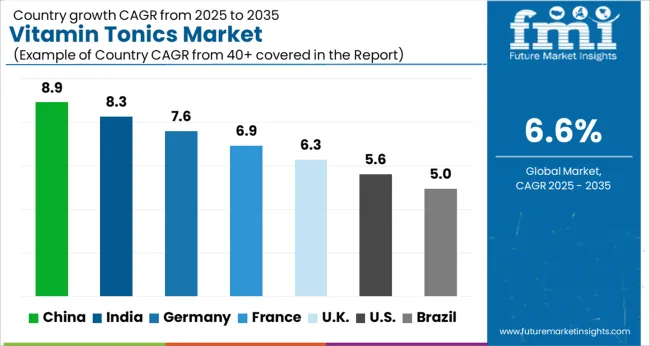
| Country | CAGR |
|---|---|
| China | 8.9% |
| India | 8.3% |
| Germany | 7.6% |
| France | 6.9% |
| UK | 6.3% |
| USA | 5.6% |
| Brazil | 5.0% |
The Vitamin Tonics Market is expected to register a CAGR of 6.6% during the forecast period, exhibiting varied country level momentum. China leads with the highest CAGR of 8.9%, followed by India at 8.3%. Developed markets such as Germany, France, and the UK continue to expand steadily, while the USA is likely to grow at consistent rates. Brazil posts the lowest CAGR at 5.0%, yet still underscores a broadly positive trajectory for the global Vitamin Tonics Market. In 2024, Germany held a dominant revenue in the Western Europe market and is expected to grow with a CAGR of 7.6%. The USA Vitamin Tonics Market is estimated to be valued at USD 4.0 billion in 2025 and is anticipated to reach a valuation of USD 6.9 billion by 2035. Sales are projected to rise at a CAGR of 5.6% over the forecast period between 2025 and 2035. While Japan and South Korea markets are estimated to be valued at USD 514.8 million and USD 286.5 million respectively in 2025.
| Item | Value |
|---|---|
| Quantitative Units | USD 10.7 Billion |
| Product Type | Syrup, Capsules, Tablets, and Multivitamin injections |
| Distribution Channel | Retail Pharmacies and Drug Stores, Hospitals Clinics, Public Hospitals, Private Clinics, and E-commerce |
| Regions Covered | North America, Europe, Asia-Pacific, Latin America, Middle East & Africa |
| Country Covered | United States, Canada, Germany, France, United Kingdom, China, Japan, India, Brazil, South Africa |
| Key Companies Profiled | Seven Seas, Sapiens Pharmaceuticals Ltd, Amway, Abbott Laboratories, Albert David Ltd, Vitabiotics Ltd, Vitane Pharmaceuticals Inc, and Fitzroy International Ltd |
The global vitamin tonics market is estimated to be valued at USD 10.7 billion in 2025.
The market size for the vitamin tonics market is projected to reach USD 20.3 billion by 2035.
The vitamin tonics market is expected to grow at a 6.6% CAGR between 2025 and 2035.
The key product types in vitamin tonics market are syrup, capsules, tablets and multivitamin injections.
In terms of distribution channel, retail pharmacies and drug stores segment to command 40.2% share in the vitamin tonics market in 2025.






Full Research Suite comprises of:
Market outlook & trends analysis
Interviews & case studies
Strategic recommendations
Vendor profiles & capabilities analysis
5-year forecasts
8 regions and 60+ country-level data splits
Market segment data splits
12 months of continuous data updates
DELIVERED AS:
PDF EXCEL ONLINE
Vitamin B12 Ingredient Market Size and Share Forecast Outlook 2025 to 2035
Vitamin C Ingredients Market Size and Share Forecast Outlook 2025 to 2035
Vitamin Biomarkers Market Size and Share Forecast Outlook 2025 to 2035
Vitamin E Antioxidant Creams Market Analysis - Size, Share, and Forecast Outlook 2025 to 2035
Vitamin C Serums (Ascorbic Acid) Market Analysis - Size and Share Forecast Outlook 2025 to 2035
Vitamin A Market Size and Share Forecast Outlook 2025 to 2035
Vitamin Ingredients Market Size and Share Forecast Outlook 2025 to 2035
Vitamin Premix Market Analysis - Size, Growth, and Forecast 2025 to 2035
Vitamin Patches Market - Size, Share, and Forecast Outlook 2025 to 2035
Vitamin Gummies Market Analysis - Size, Share, and Forecast Outlook 2025 to 2035
Vitamin D Ingredients Market Size, Growth, and Forecast for 2025 to 2035
Vitamin Yeast Market Analysis by Vitamin Composition, Application, Product Claim andOther Types Through 2035
Vitamin D Testing Market Analysis by Component, Type, and Region: Forecast for 2025 to 2035
Vitamin Supplement Market Insights - Wellness & Industry Growth 2025 to 2035
Vitamin B Test Market Insights - Size, Trends & Forecast 2025 to 2035
Vitamin and Mineral Supplement Market Insights - Trends & Forecast 2025 to 2035
Vitamin and Mineral Market – Growth, Innovations & Health Trends
Vitamin Shot Market – Growth, Demand & Functional Benefits
Vitamin D Deficiency Treatment Market
Multivitamin-Infused Skincare Market Analysis - Size, Share, and Forecast Outlook 2025 to 2035

Thank you!
You will receive an email from our Business Development Manager. Please be sure to check your SPAM/JUNK folder too.
Chat With
MaRIA